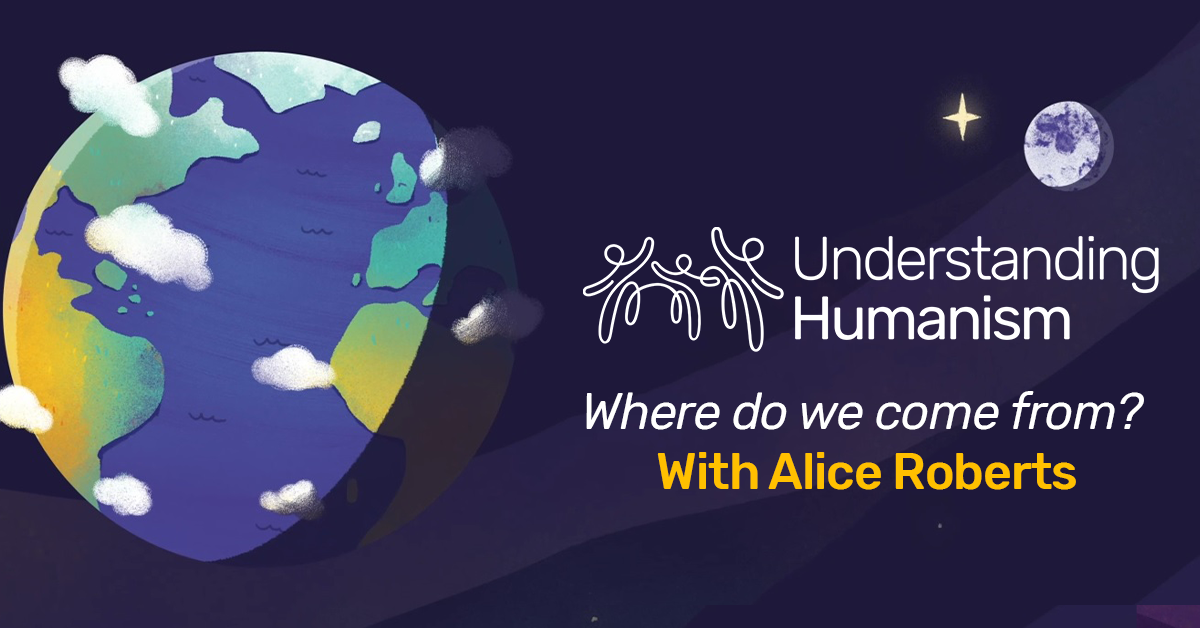Humanists UK has teamed up with broadcaster and scientist Professor Alice Roberts to tell the scientific story of our origins in a brand new animation aimed at primary school children entitled Where do we come from? The video officially launches online today, and is the latest resource from Understanding Humanism, the charity’s programme supporting learning about humanism in classrooms across the country.
In the video, Alice Roberts, who is Vice President of Humanists UK, describes the scientific account of the evolution of the universe, stars, planets, and life in an enlightening and accessible way. The animation should support young people to understand where humanists find wonder in the scientific story of where we come from and in our capacity to look for and find the evidence to back it up. It also reveals why humanists see something to be celebrated in how such ‘simple’ ingredients can lead to such wondrous results – our ‘thinking, feeling, choosing, caring, dreaming, wondering’ selves.
The short film was animated by OOF Animation. It will accompany many other resources and activities on Humanists UK’s Understanding Humanism website, designed to raise awareness and understanding of the humanist approach to life. Humanists UK supports teachers and schools to deliver engaging lessons about humanism as an example of a non-religious worldview as part of an inclusive education about religion and worldviews. Its resources are downloaded tens of thousands of times every year.
Director of Understanding Humanism Luke Donnellan commented:
‘Primary teachers often tell us that while an abundance of resources exist on the religious creation stories, it can be harder to find good material on the scientific story of our origins – we wanted to help correct that. We very much hope it will be of value to teachers and parents.’
‘We wanted to create something that didn’t just present the scientific facts, but brought alive the grandeur that can be found in this story of life. That we are all made of stardust; that we are connected to every other living thing on the planet; and that we are lucky to be here and to have the capacities we do. It’s a story that is not yet complete. But as the film acknowledges, the humanist, scientific approach is to keep looking for natural answers to our questions. It may be the children in today’s classrooms who help us to find those answers.’
Notes:
For further comment or information, media should contact Humanists UK Director of Understanding Humanism Luke Donnellan at education@humanists.uk or phone 020 7324 3070.
Find out more about our work on understandinghumanism.org.uk.
Understanding Humanism is Humanists UK’s education service. It aims to introduce young people to humanism as an example of a non-religious worldview. It provides teachers with the resources necessary to teach accurate, high-quality lessons about humanism, and assists them with the development of their own subject knowledge. The Understanding Humanism website offers information and services, including free school speakers who can work with teachers to broaden students’ understanding. Visit Understanding Humanism at understandinghumanism.org.uk.
Humanists UK is the national charity working on behalf of non-religious people. Powered by 100,000 members and supporters, we advance free thinking and promote humanism to create a tolerant society where rational thinking and kindness prevail. We provide ceremonies, pastoral care, education, and support services benefitting over a million people every year and our campaigns advance humanist thinking on ethical issues, human rights, and equal treatment for all.

